Unit 8 British Foreign Relations (英国的外交关系)
英语国家概况(1)课程第2次形成性考核答案和讲评

英语国家概况(1)课程形成性考核题英语国家概况(1)课程第2次形成性考核答案和讲评(Unit 06-10)The United Kingdom (II)I. True or False:Unit 6 British Literature(T) 01. The early British literature was concerned with Christianity, and Anglo-Saxons produced many versions of the Bible. (Unit 6)(F) 02. There was a general flowering of culture and intellectual life in Europe during the 17th and 18th centurywhich is known as “The Renaissance”. (Unit 6)There was a general flowering of culture and intellectual life in Europe between the 14th and 17th centuries which is known as “The Renaissance”. (T)(T) 03. Keats, Shelley and Byron brought the Romantic Movement to its height. (Unit 6)(T) 04. Robinson Crusoe tells the story of a shipwreck and a solitary survival. (Unit 6)(F) 05. Writers of romantic literature are more concerned with the power of reason than with imagination andfeeling. (Unit 6)Writers of romantic literature are more concerned with imagination and feeling than with the power of reason. (T)(F) 06. Thomas Hardy, t he author of Tess of the D’Urbervilles, was a first-class novelist but a second-class poet.(Unit 6)Thomas Hardy, the author of Tess of the D’Urbervilles, was not only a first-class novelist but also a first-class poet. (T)Unit 7 British Education System(F) 07. The purpose of British education is to provide children with literacy and the other basic skills. (Unit 7)The purpose of British education is not only to provide children with literacy and the other basic skills but also to socialize the children. (T)(T) 08. The 1944 Education Act made entry to secondary schools and universities “meritocratic”. (Unit 7)(F) 09. British universities are mainly private bodies which collect funds by themselves. (Unit 7)British universities are mainly public bodies which receive funds from the central government. (T) (T) 10. In Oxford and Cambridge, the BA converts to an MA several years later, upon payment of a fee. (Unit 7) (F) 11. Grammar schools in Britain select children at the age of 11 and provide them with a language education.(Unit 7)Grammar schools in Britain select children at the age of 11 and provide them with a general education.(T)(T) 12. Comprehensive schools admit children without reference to their academic abilities. (Unit 7)Unit 8 British Foreign Relations(F) 13. When the Second World ended, Britain no longer was the largest military power in Western Europe.(Unit 8)When the Second World ended, Britain was the largest military power in Western Europe. (T)(F) 14. According to Unit 8, the most single important factor which influences British contemporary foreignpolicy is its history. (Unit 8)According to Unit 8, the contemporary foreign policy of the UK is greatly influenced by its imperialhistory and also by its geographical traits. (T)(T) 15. The Prime Minister and Cabinet decide on the general direction of Britain’s foreign policy. (Unit 8) (F) 16. Britain is a parliamentary monarch. (Unit 8)Britain is a parliamentary democracy and constitutional monarch. (T)(T) 17. Britain hosts a large military American presence and there are some American military bases in the UK.(Unit 8)(F) 18. Britain is not a member of the NATO due to its disagreement with some European countries on defencepolicy. (Unit 8)Britain is a member of the NATO despite its disagreement with some European countries on defence policy. (T)Unit 9 The British Media(T) 19. On an average day, an overwhelming majority of Britons over the age 15 read a national or local paper.(Unit 9)(F) 20. The British media play an important role in shaping a national education. (Unit 9)The British media play an important role in shaping a national culture. (T)(T) 21. Free press has the function of keeping an eye on the government, and therefore it is called the watchdog of parliamentary democracy. (Unit 9)(F) 22. The tabloids are larger format newspapers with colour photos and catchy headlines. (Unit 9)The tabloids are smaller format newspapers with colour photos and catchy headlines. (T)(T) 23. The British Broadcasting Corporation is funded by licence fees and viewers must buy a licence each year for their TV set. (Unit 9)(F) 24. The BBC World Service, the international branch of the BBC, broadcasts in English and 24 otherlanguages throughout the world. (Unit 9)The BBC World Service, the international branch of the BBC, broadcasts in English and 42 other languages throughout the world. (T)Unit 10 Sports, Holidays and Festival in Britain(F) 25. The tradition of having Sunday off derived from the Buddhism. (Unit 10)The tradition of having Sunday off derived from the Christian Church. (T)(F) 26. The origin of Bowling lies in the victory celebration ceremony by the modern soldiers. (Unit 10)The origin of Bowling lies in the victory celebration ceremony by the ancient warriors. (T)(F) 27. The game of Golf was invented by the Irish. (Unit 10)The game of Golf was invented by the Scottish. (T)(T) 28. The extremist animal-lovers’ group would like to have horse-racing banned. (Unit 10)(T) 29. Christmas Pantomime is one of the three Christmas traditions that are particularly British. (Unit 10) (T) 30. In Ireland, New Year’s Eve called Hogmanay (December 31st) is the major winter celebration. (Unit 10)II. Choose the best answer:Unit 6 British Literature01. Which of the following books is written by Geoffrey Chaucer? (Unit 6) Key AA. The Canterbury Tales.B. Beowulf.C. King Lear.D. Le Morte D’Arthur.02. Which literary form flourished in Elizabethan age more than any other form of literature? (Unit 6)Key CA. Novel.B. Essay.C. Drama.D. Poetry.03. Which of the following did NOT belong to Romanticism? (Unit 6) Key DA. Keats.B. Shelley.C. Wordsworth.D. Defoe.04. Which of the following is a tragedy written by Shakespeare? (Unit 6) Key BA. Dr. FaustusB. Macbeth.C. Frankenstein.D. The Tempest.05. Which of the following writers was NOT associated with Modernism? (Unit 6) Key CA. D. H. Lawrence.B. E. M. Foster.C. Charles Dickens.D. Virginal Woolf.06. Which of the following writers wrote the book “1984” that began “Postmodernism” in British literature”?(Unit 6) Key AA. George Orwell.B. Robert L. Stevenson.C. D. H. Lawrence.D. Virginia Woolf.Unit 7 British Education System07. In Britain, the great majority of parents send their children to ______. (Unit 7) Key CA. private schoolsB. independent schoolsC. state schoolsD. public schools08. In Britain, children from the age 5 to 16 ______. (Unit 7) Key BA. can legally receive partly free educationB. can legally receive completely free educationC. can not receive free education at allD. can not receive free education if their parents are rich09. Which of the following is a privately funded university in Britain? (Unit 7) Key DA. The University of Cambridge.B. The University of Oxford.C. The University of Edinburgh.D. The University of Buckingham.10. Which of the following is NOT a characteristic of the Open University? (Unit 7) Key CA. It’s open to everybody.B. It requires no formal educational qualifications.C. No university degree is awarded.D. University courses are followed through TV, radio, email and internet, etc.11. In the examination called “the 11 plus”, students with academic potential go to ______. (Unit 7)Key AA. grammar schoolsB. comprehensive schoolsC. public schoolsD. technical schools12. Which of the following is NOT true about the British education system? (Unit 7) Key DA. It’s run by the state.B. It’s funded by the state.C. It’s supervised by the state.D. It’s dominated by the state.Unit 8 British Foreign Relations13. Britain had a big influence on the post-World War II international order because ______. (Unit 8)Key BA. it used to be a great imperial powerB. it used to be a great imperial powerC. it defeated Hitler’s armyD. it got support from its former colonies.14. Which countries are the permanent members of the UN Security Council? (Unit 8) Key CA. France, China, Germany, Russia and Britain.B. The United States, France, Britain, Germany and Russia.C. China, Russia, France, Britain and the United States.D. Britain, China, France, the United States and Japan.15. How much of the globe did Great Britain rule in its imperial prime? (Unit 8) Key BA. One fourth of the globe.B. One fifth of the globe.C. One third of the globe.D. Two thirds of the globe.16. Which of the following is not involved in making British foreign policy? (Unit 8) Key AA. The Queen of the UK.B. The Foreign Commonwealth Office.C. The Prime Minister.D. The Cabinet.17. Which of the following countries does not have nuclear weapon capabilities? (Unit 8)Key CA. BritainB. The United StatesC. GermanyD. France.18. The Commonwealth is an organization of ______ that were once part of the British Empire. (Unit 8)Key BA. about 40 countriesB. about 50 countriesC. about 60 countriesD. about 70 countriesUnit 9 The British Media19. Which of the following is the world’s oldest national newspaper? (Unit 9)Key CA. The Times.B. The Guardian.C. The Observer.D. The Financial Times.20. Which of the following is the British oldest daily newspaper? (Unit 9) Key DA. The Telegraph.B. The News of the World.C. The Guardian.D. The Times21. A free press is considered very important to the functioning of parliamentary democracy because ______.(Unit 9) Key AA. it plays a watchdog function, keeping an eye on the governmentB. it informs people to current affairs in the worldC. it provides people with subjective reportsD. it publishes short pamphlets for Parliament22. How many newspapers are there in Britain? (Unit 9) Key DA. About 100.B. About 140.C. About 150.D. About 150.23. Which of the following about the BBC is NOT true? (Unit 9) Key CA. There is no advertising on any of the BBC programmes.B. The BBC is funded by licence fee paid by people who possess television sets.C. The BBC has four channels.D. The BBC provides the World Service throughout the world.24. Which of the following newspapers is a tabloid? (Unit 9) Key AA. The News of the World.B. East Enders.C. The Telegraph.D. The Guardian.Unit 10 Sports, Holidays and Festival in Britain25. Which of the following was NOT invented in Britain? (Unit 10) Key CA. Football.B. Tennis.C. Basketball.D. Cricket.26. Where is the International tennis championships held? (Unit 10) Key BA. Wembley.B. Wimbledon.C. London.D. Edinburgh.27. Which of the following is truly a sport of the royal family? (Unit 10) Key DA. Cricket.B. Skiing.C. GolfingD. Horse racing.28. Easter commemorates ______. (Unit 10) Key CA. the birth of Jesus ChristB. the Crucifixion of Jesus ChristC. the Crucifixion and Resurrection of Jesus ChristD. the coming of spring29. Which celebration particularly happens on the Queen’s birthday? (Unit 10) Key CA. Bonfires.B. The Orange March.C. Trooping the Colour.D. Masquerades.30. On which day is Halloween celebrated? (Unit 10) Key AA. October 31st.B. November 5th.C. March 17th.D. December 25th.III. E xplain the following terms:Unit 6 British Literature61. The Renaissance (Unit 6)The Renaissance is the period of time in Europe between 14th and 17th centuries, when art, literature, philosophy, and scientific ideas became very important and a lot of new art etc. was produced.62. Romanticism (Unit 6)Roughly the first third of the 19th century makes up English literature’s romantic period. Writers of romantic literature are more concerned with imagination and feeling than with the power of reason. A volume of poems called Lyrical Ballads written by William Wordsworth and Samuel Taylor Coleridge is regarded as the romantic poetry’s “Declaration of Independence”. Keats, Byron and Shelley, the three great poets, brought the Romantic Movement to its height. The spirit of Romanticism also occurred in the novel.63. Modernism (Unit 6)Modernism refers to a form of literature mainly written before World War II. It is characterised by a high degree of experimentation. It can be seen s a reaction against the 19th century forms of Realism. Modernist writers express the difficulty they see in understanding and communicating how the world works. Often, Modernism writing seems disorganized, hard to understand. It often portrays the action from the viewpoint of a single confused individual, rather than from the viewpoint of an all-knowing impersonal narrator outside the action. One of the most famous English Modernist writers is Virginia Woolf.Unit 7 British Education System64. Independent schools (Unit 7)Independent schools are commonly called public schools which are actually private schools receive their funding through the private sector and tuition rates, with some government assistance. Independent schools are not part of national education system, but quality of instruction and standards are maintained through visits from Her Majesty’s Inspectors of Schools. These schools are restricted to the students whose parents arecomparatively rich.65. The Open University (Unit 7)The Open University was founded in Br itain in the 1960’s for people who might not get the opportunity for higher education for economic and social reasons. It’s open to everybody and does not demand the same educational qualifications as the other universities. University courses are followed through TV, radio, videos and a net work of study centres. At the end of their studies at the Open University, successful students are awarded a university degree.Unit 8 British Foreign Relations66. The foundation of British foreign policy (Unit 8)The contemporary foreign policy of the UK is greatly influenced by its imperial history and also by its geographical traits. As Britain lost its empire recently, British policy-makers frequently forget that Britain is not as influential as it used to be in world affairs. Another decisive influence upon the way Britain handles its external affairs is geopolitical attitude to Europe.67. Britain and the EU (Unit 8)Britain joined the European Community in 1973 which is now called the EU. Britain’s pa rticipation in the EU remains controversial. At the centre of the controversy is the fact that it is not clear about what the EU is and what it will become. The UK has always been interested in encouraging free trade between countries and is therefore very supportive of the EU as a free trade area. Britain likes to regard the EU as a place where economic cooperation is possible and where a flow of trained personnel and goods are possible. But Britain has always been less enthusiastic about giving up its national sovereignty to the EU.68. Britain and the United States (Unit 8)The British foreign policy is also affected by its relationship with the United States. During World War II, the two countries were closely allied and continued to work together closely in the postwar years, because they had many things in common about the past and the world situation. Even today, Britain and American policy-makers share the general ideas in many respects. The British are beginning to realize that their own foreig n policy action can be limited by the U.S., but both sides worked hard to maintain the “special relationship”.69. The Commonwealth (Unit 8)The Commonwealth is a voluntary association of states which is made up mostly of former British colonies. There are about 50 members of the Commonwealth: many of these are developing countries like India and Cyprus; others are developed countries like Australia, Canada and New Zealand. The Commonwealth was set up a forum for continued cooperation and as a sort of support network.Unit 9 The British Media70. Quality papers (Unit 9)The quality papers belong to one of the categories of the national dailies. They carry more serious and in-depth articles of particular political and social importance. They also carry reviews, such as book reviews, and feature articles about high culture. These papers are also referred to as “the broadsheets” because they are printed on large size paper. The readers of such newspapers are generally a well-educated middle class audience.71. Tabloids (Unit 9)A tabloid is a small format newspaper with colour photos and catchy headlines. Tabloids are interested in scandals and gossip usually about famous people. They also carry lots of crime, sports and sensational human interest stories so as to attract readers. Stories are short, easy to read and often rely more on opinions than fact. They belong to a catalogue of national papers different from quality papers.Unit 10 Sports, Holidays and Festival in Britain72. Cricket and “fair play” (Unit 10)Cricket was one of the very first team sports in Britain to have organised rules and to be played according to the same rules nationally. The reason that fixed rules were applied to cricket so early on was a financial one: aristocrats loved betting on cricket matches and if people were going to risk money on a game, they wanted to ensure that the game would be played fairly. In Britain people from all walks of life play cricket, but in the 19th century, cricket was a sport played mai nly by the upper class. It was a kind of a “snob” game played by boys who attended public schools. As generations of public school boys grew up to become the civil servants and rulers of the UK and its colonies, cricket became associated with a set of moral values, in particular, the idea of “fair play” which supposedly characterised British government.73. Wimbledon (Unit 10)Wimbledon is the name of a London suburb. In Wimbledon, the world’s best players gather to compete on grass courts. It is one of the major events of the British sporting calendar and probably the most famous tennis event in the world. Besides actually watching the tennis matches, other activities closely associated with the “Wimbledon fortnight” are eating strawberries and cream,drinking champagne and hoping that it doesn’t rain.。
英语国家概况社会文化入门简答题上册答案

u n i t71 (1)What are the purposes of the British education system? (2)Please comment on these purposes. (3)What are the main purposes of the Chinese education system?(4)Are there any differences or similarities in the education of the two nations? 答:(1)The purpose of the British education system is to teach children practical skills and socialize them. (2)Children learn practical skills, and the rules and values they need to become good citizens, to participate in the community, and to contribute to the economic prosperity of an advanced industrial economy. (3)The purpose of the Chinese education is to provide children with literacy and the other basic skills they will need to become active members of society. (4) In china, people think school is jus t about teaching children what are often called” the three R’s---“reading, writing and ‘arithmetic”(reading, writing and arithmetic).2. How does the British education reflect social class?British education reflect the deeper divisions in British society in which social class is still very important: class inequality can be erased or continued according to education policy. What’s more, the enduring feature of British education is the continuing debate over how “equal” educational opportunity should be. In British, the accent you speak with, the clothes you wear, and the schools you attend are all markers that identify your social class. The school (or college)tie is a clear marker of social class. Even on informal occasions you will sometimes see men wearing their school ties as belts to hold up their trousers –proudly displaying their attendance at a certain school. In Britain, where you are educated is very important to you future.3 what are the major changes that have taken place since World war 2? Is British education moving towards more progress or more equality? Pick up some examples from the text to illustrate your points.Other major changes to the British education system were caused by world war Ⅱ。
英语国家社会与文化入门unit 8 British Foreign Relations
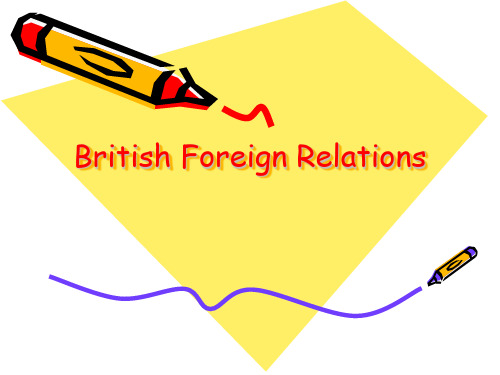
V. Britain and the United States
• the Suez Crisis during 1956
– The British are beginning to realize that their own foreign policy actions can be limited by the US. Afterward both sides have worked hard to maintain the “special relationship.
I. Britain Then and Now
• The glory of British empire • The influence of Second World War
could no longer afford to maintain its empire the British realized countries should be granted the independence.
•
Hale Waihona Puke IV. Britain and International Institutions
• Britain is also a member of the Commonwealth, a voluntary association of states which is made up of mostly former British colonies. There are 50 members of the Commonwealth including developing countries such as India and Cyprus and advanced industrial countries such as Australia, Canada and New Zealand.
Unit_8__British_Foreign_Relations
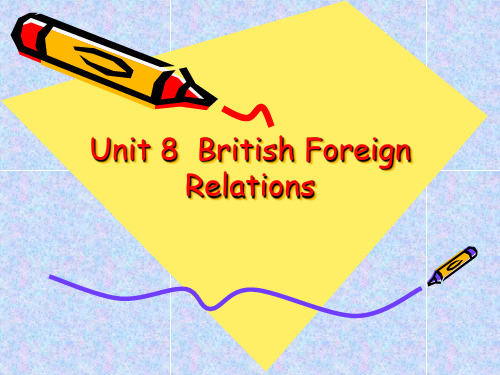
How many today?
• There are still 16 overseas possessions under the jurisdiction of the British: • Overseas Territory (9): Anguilla, Bermuda, British Indian Ocean Territory, British Virgin Islands, Cayman Islands, Gibraltar, he stunned the game LVL Island, St. Helena and its subsidiary Island, Turks and Caicos Islands .
The Treasury
Relations with other countries and organizations
• • • • • Britain Britain Britain Britain Britain and and and and and the UN the EU the Commonwealth NATO the US
How many colonies in the past?
• There are 56 countries and 2 regions under British rule • Oceania (14): Australia, New Zealand, Vanuatu, Tuvalu, Solomon Islands, Samoa, Nauru, Saint Vincent and the Grenadines, Saint Lucia, Saint Kitts and Nevis, Papua New Guinea, Fiji , Barbados, Kiribati.
【VIP专享】英语概况上册第8单元英国外交关系翻译
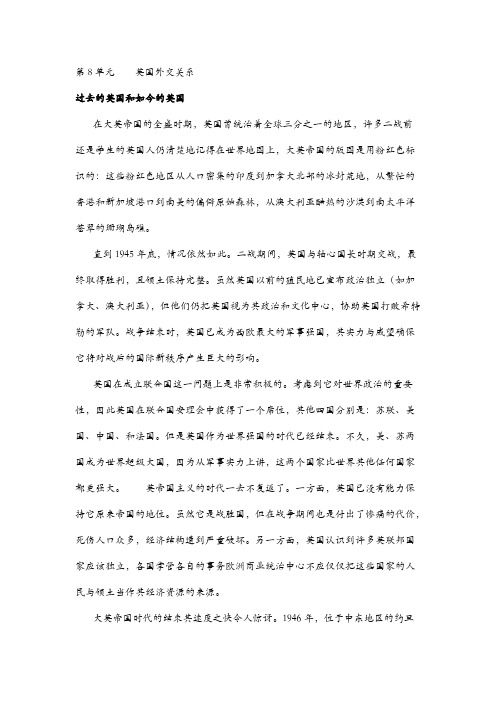
第8单元英国外交关系过去的英国和如今的英国在大英帝国的全盛时期,英国曾统治着全球三分之一的地区,许多二战前还是学生的英国人仍清楚地记得在世界地图上,大英帝国的版图是用粉红色标识的:这些粉红色地区从人口密集的印度到加拿大北部的冰封荒地,从繁忙的香港和新加坡港口到南美的偏僻原始森林,从澳大利亚酷热的沙漠到南太平洋苍翠的珊瑚岛礁。
直到1945年底,情况依然如此。
二战期间,英国与轴心国长时期交战,最终取得胜利,且领土保持完整。
虽然英国以前的殖民地已宣布政治独立(如加拿大、澳大利亚),但他们仍把英国视为其政治和文化中心,协助英国打败希特勒的军队。
战争结束时,英国已成为西欧最大的军事强国,其实力与威望确保它将对战后的国际新秩序产生巨大的影响。
英国在成立联合国这一问题上是非常积极的。
考虑到它对世界政治的重要性,因此英国在联合国安理会中获得了一个席位,其他四国分别是:苏联、美国、中国、和法国。
但是英国作为世界强国的时代已经结束。
不久,美、苏两国成为世界超级大国,因为从军事实力上讲,这两个国家比世界其他任何国家都更强大。
英帝国主义的时代一去不复返了。
一方面,英国已没有能力保持它原来帝国的地位。
虽然它是战胜国,但在战争期间也是付出了惨痛的代价,死伤人口众多,经济结构遭到严重破坏。
另一方面,英国认识到许多英联邦国家应该独立,各国掌管各自的事务欧洲商业统治中心不应仅仅把这些国家的人民与领土当作其经济资源的来源。
大英帝国时代的结束其速度之快令人惊讶。
1946年,位于中东地区的约旦宣告独立。
第二年,印度、巴基斯坦相继独立。
1948年,缅甸、锡兰(即现在的斯里兰卡)宣告独立并脱离了英联邦,拒绝承认英国君主作为他们新型国家的领导。
在今后的几十年中,非殖民主义化进程继续,其它的领土和殖民地都相继独立或重新回到原统治者手中。
有时,国家独立的过程是充满暴力的,比如肯尼亚和埃及。
由于大英帝国的衰落只是近些年的事许多活着的人还清楚地记得英国曾经是世界上最强大、最富有的国家之一。
英美文化概论提纲

英美文化概论提纲Unit 1 a brief introduction to the united kingdom 1一 a brief introduction1.全称 The United Kingdom of Great Britain and northern Ireland--P17 III 12.构成England LondonScotland EdinburghWales CardiffNothern Ireland Belfast--P17 III23.历史A公元43世纪RomanB公元7世纪Anglo –saxons 安格鲁撒克逊人C 8世纪末阿尔弗雷德大帝King Alfred北欧海盗D 1066年诺曼征服NormansWilliam of NormandyBattle of HastingsKing Harold4.英国内战 civil war 资产阶级革命二Scotland1. Glasgow 最大城市 --P16 II 82. 大学15世纪 ancient and international university --P17 III 11三WalesUnlike England it did not fall to the Anglo-Saxon invaders of the 5th century --P16 II 11名词解释London:the largest city located in the south of the country .London is dominant in the UK in all fields;government finance and culture.London is one of the top three financial centers in the worldUnit 2 a brief introduction to the united kingdom iiNorthern Ireland1.宗教爱尔兰人是天主教徒 Catholics英国人是新教徒 Protestants--P33 I 62.1921年独立 Irish State (分水岭)3.爱尔兰南部26郡成立自由邦北部6 郡仍属英国—P34 II 104 .Loyalist 民族派希望加入爱尔兰共和国Unionist 联合派亲英国5.The official IRA 倾向于政治手段解决–P34 III 4The Provisional IRA 军事–P35 III 5“The Bullet and the Ballot Box”—P35 III 106.区分 Sinn Fein是政党 --P33 I 8/P35 III 11,121919 IRA是军事团体非政党7 .1973年 Power-Sharing mechanism权利分享机制—P34 II 88.1972 “Bloody Sunday”—P34 II 79.1985 Anglo-Irish agreement --P33 I 910. Downing –Street Declaration唐宁街宣言授权英军司令直接干预北爱治安事务名词解释1.”Home-rule”:1914年被签署成为法律。
2020版《英美国家文化概况》教学大纲
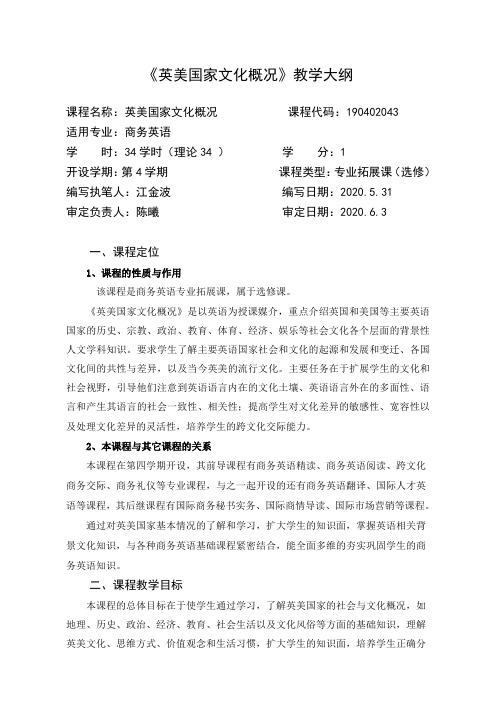
《英美国家文化概况》教学大纲课程名称:英美国家文化概况课程代码:190402043适用专业:商务英语学时:34学时(理论34 )学分:1开设学期:第4学期课程类型:专业拓展课(选修)编写执笔人:江金波编写日期:2020.5.31审定负责人:陈曦审定日期:2020.6.3一、课程定位1、课程的性质与作用该课程是商务英语专业拓展课,属于选修课。
《英美国家文化概况》是以英语为授课媒介,重点介绍英国和美国等主要英语国家的历史、宗教、政治、教育、体育、经济、娱乐等社会文化各个层面的背景性人文学科知识。
要求学生了解主要英语国家社会和文化的起源和发展和变迁、各国文化间的共性与差异,以及当今英美的流行文化。
主要任务在于扩展学生的文化和社会视野,引导他们注意到英语语言内在的文化土壤、英语语言外在的多面性、语言和产生其语言的社会一致性、相关性;提高学生对文化差异的敏感性、宽容性以及处理文化差异的灵活性,培养学生的跨文化交际能力。
2、本课程与其它课程的关系本课程在第四学期开设,其前导课程有商务英语精读、商务英语阅读、跨文化商务交际、商务礼仪等专业课程,与之一起开设的还有商务英语翻译、国际人才英语等课程,其后继课程有国际商务秘书实务、国际商情导读、国际市场营销等课程。
通过对英美国家基本情况的了解和学习,扩大学生的知识面,掌握英语相关背景文化知识,与各种商务英语基础课程紧密结合,能全面多维的夯实巩固学生的商务英语知识。
二、课程教学目标本课程的总体目标在于使学生通过学习,了解英美国家的社会与文化概况,如地理、历史、政治、经济、教育、社会生活以及文化风俗等方面的基础知识,理解英美文化、思维方式、价值观念和生活习惯,扩大学生的知识面,培养学生正确分析有关英美等国问题的能力,并能以正确的眼光看待世界上所发生的问题,提高学生对文化差异的敏感性和宽容性,培养学生跨文化交际能力。
同时也促进加强学生的语言学习,达到提高其商务英语水平的目的。
英语概况英语国家资料Unit8

英语概况英语国家资料Unit8Unit 8British Foreign RelationBritain Then and Now1.After a lengthy fight with the Axis powers, the United Kingdom eventuallyemerged victorious and with its empire still largely intact.When the war ended, Britain was the largest military power in Western Europe. It power and prestige ensured it would havea big influence on the postwar international order.2. Britain was active in setting up at the United Nations and, in recognition ofits continuing importance to world politics it was awarded a seat on the UN security Council, along with the other recognised “great powers” of theSoviet Union, the United States, China and France.3. the age of imperialism was over too.On one hand, the British could no longer afford to maintain its empire, it had paid a terrible price in terms of lives and in terms of economicdestruction.On the other hand, the British realised that countries should be granted the independence and left to run their own affairs.4. The end of the great British empire was surprisingly rapid. Jordan, India,Pakistan, Burma, Ceylon got their independence one after another.5. Today’s BritainA medium-sized European country. Britain no longer rules avastoverseas empire, but participates as an equal member in the EU. It lacks the all-powerful navy of its imperial past, but it does have an independent nuclear deterrent and technologically advanced armed forces. Britisheconomy ranks about sixth in the world in terms of size, and as a banking centre, it retains considerable influence on the international economy.The Foundations of Britain’s Foreign PolicyThe contemporary foreign policy of the UK is greatly influenced by its imperial history and also by its geopolitical traits.1. Perhaps the most important single factor which influences Britishpolicy-makers is its history.Because Britain lost its empire so recently, British policy-makersfrequently forget that Britain is not as influential as it used to be in world affairs. Historians argue that the British foreign policy-makers retain very conservative and traditional views of Britain’s role as a world power and point to many major foreign policy decisions as examples.2. A second decisive influence upon the way Britain conducts its externalaffairs is geopolitical.Britain is an island state, and this is considered an important psychological factor as well as one which has influenced Britain’seconomic and military development.3. Britain’s island loc ation created a sense of psychological isolation inits inhabitants.When Britons wanted to go abroad, they could not just walk across aborder: they had to get into a boat and sail often for a long time. thisphysical isolation had long been diminished by the development ofairlines and more recently by the opening of the Channel Tunnel.Nevertheless, psychologically, Britons still sometimes feel cut off.How Foreign Policy is MadeThe Prime Minister and Cabinet decide on the general direction of Britain’s foreign policy. The main government department invol ved is of course the Foreign and Commonwealth Office (FCO), but many othergovernment ministers also play a part in formulating and executing thegovernment’s decisions.The Ministry of Defence, although it is considered less important than the FCO, is a n important player. It is responsible for ensuring Britain’s defence and managing Britain’s involvement in its military treaty commitments.The Department of Trade and Industry is concerned with formulating international trade policy and managing British commercial relations with other countries.The Treasury makes decisions on how much money other departments can have each year.Since Britain is parliamentary democracy, the governm ent’s foreign policy in theory represents the desires of its electorate,but in fact British citizens are more concerned about issues closer to home.On the whole, they are not very inclined to try to influence the direction of Britain’s foreign policy. Th ere are a number of different interest groupshowever, and it is interesting that the rare occurrences of civil disobedience in the UK often involve foreign policy issues.Britain and International InstitutionsIn the past, Britain was powerful enough to act independently in the world in order to bring about its policy objectives. Nowadays its foreign policy islargely shaped by its participation in a number of important international institutions.In the UNBritain is one of the five permanent members of the United Nations Security Council. It also is the sixth largest contributor to the UN’s budget. As aSecurity Council member, Britain retains the ability to have a large influence on world affairs.In the EUMore important to Britain in the day to day running of its affairs is its membership in the EU.The EU has its roots in the experience of the two world wars which tore Europe apat\rt in the first half of this century. Some of the countries involved decided that they should work together to ensure peace rather than against each other which seemed to lead to war.European states began to integrate their economies as a way of fostering cooperation and shared interests with each other, and this paved the way for the formation of the EuropeanEconomic Community, a common market. In 1973, the United Kingdom joined the EEC.1. This was an important psychological decision for the nationbecause traditionally Britain had looked beyond its European neighbours, feeling that really it had more common with the US and theCommonwealth.2. in fact, the decision to join the EEC was a natural one given thatBritish economic, political and military interests were already deeplybound up with other European countries.3. The decision to join the EEC was very controversial; and today,Britain’s participation in the EU, as it is now called, remained controversial.At the centre of the controversy is the fact that it is not clear what theEU is and what it will become. The UK has always been very interested in encouraging free trade between countries and istherefore very supportive of the EU as a free area.However, the UK has always been less enthusiastic about giving up its national sovereignty to a European government.The UK likes to think of the EU as a place where economic cooperation is possible, with the free movement of goods and people. It is less certain about the possibility of the EU becoming a kind of federal “super state”.In other words, while Britons are happy to have otherEuropean countriesas trading partners, they are reluctant to think about them as fellowcitizens belonging to the same state.Because of the many controversies that Britain gets into with its European neighbours about the future of the EU, looking from outside it seems that Britain is a “bad” European state which is not really committed to E urope.This is not true any more than the idea of joining the EU representedBritain’s “turning its back” on old friends and commitments.Britain, while often at the centre of policy controversies with its fellow EU members, is nevertheless deeply committed to it. The controversies are borne of disagreements on what the future of the EU should be, rather than abut whether Britain should be a member or not. Britain frequently fights over what the policies should be, but, having agreed, carries these polices out.In the CommonwealthBritain is also a member of the Commonwealth, a voluntary association of states which is made up mostly of former British colonies. There are 50 members of the Commonwealth. It was set up as forum for continuedcooperation and as a sort of support network.In addition to holding conferences and meetings, the Commonwealth provides educational and technical help. Two-thirds of British development aid goes to Commonwealth countries.Britain and the United StatesAnother major factor which influences British foreign policyis its relationship with the United States.Nevertheless, the “special relationship” with the United States has gone through ups and downs. The major test of Anglo-American relationsoccurred during the 1956 Suez Crisis.To British surprise, the Americans used the economic power to force the Anglo-French forces withdraw. Since then, both sides have worked hard to maintain good relations.British Security and Defence PolicyBritain spends more on defence than most other advanced industrial countries and maintains larger professional forces. It is the third largest spender in the world and is ranked fifth or sixth in terms of its military power.It is a member of th e nuclear “club”, maintaining an extensive n uclearcapability which makes it a little brother to the nuclear superpowers and therefore more powerful than those countries who lack nuclear weapons.The keystone of British defence policy is its participation in the North Atlantic Treaty Organisation, more commonly known as NATO.Britain was proud of be invited to lead the newly established Rapid Reaction Corps, NATO’s recently established land-based force which is designed to provide an early military response to a crisis.In addition to its NATO commitments, Britain retains an independent nuclear weapons capability. Since Britain is a traditional sea power, it is perhaps no surprise that its nuclear force is a naval one.It is highly unlikely that Britain would ever use, or need touse, its nuclear capability and there are many Britons who feel it is unsafe and unnecessary to rely on nuclear weapons. But nuclear weapons are important for the prestige of a country as well as its protection.__。
british foreign relations 英国外交史

Untied Nations(UN)
set up in 1945 There are 193 sovereign states in the UN. Member of UN Security Council(great influence) One of the five permanent members Other members Russia China source: /docs/guides/canvas/ the US France
British colonial(殖民 地)territtory was called "the empire upon which the sun never set"(日不落帝国) But many former colonies like Canada and Australia (1945) had been granted their political independence . So ,the end of the British Empire left the UK a medium-sized European country.
Foreign and Commonwealth Office
Formed in 1968 Administers the diplomatic service and overseas development
Ministry of Defense
Treasury
Department of Trade and Industry
source: /docs/authentication/
The Department of Trade and Industry
General direction of Britain’s foreign
英国外交关系英文版
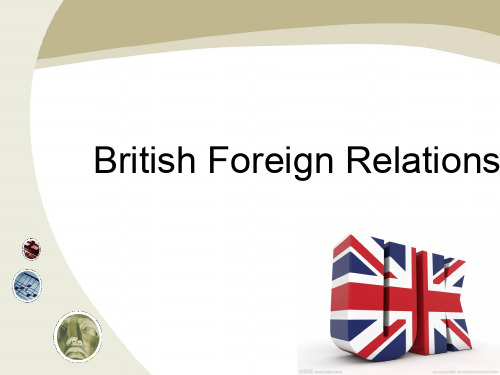
• It is clear that Britain has been changed fro m a compulsive partner to an optional one in American global strategy. Britain’s importa nce to the US decreased in economic and di plomatic areas.
The making of Britain’s foreign policy
The general direction of Britain’s foreign policy is mainly decided by the Prime Minister and Cabinet. The Foreign and Commonwealth Office(FCO)(英国联邦与国际事务部),the main government depa rtment,plays a significant role in the making of Britain’s foreign p olicy Many other government ministries such as the Ministry of Def ence and the Department of Trade and Industry also play a part in formulating and carrying out the government’s decisions But an e xtremely influential player in Britain’s foreign policy is the Treasu ry.The Treasury makes decisions on how much money other depar tments can have each year.
《英国社会与文化》教学大纲
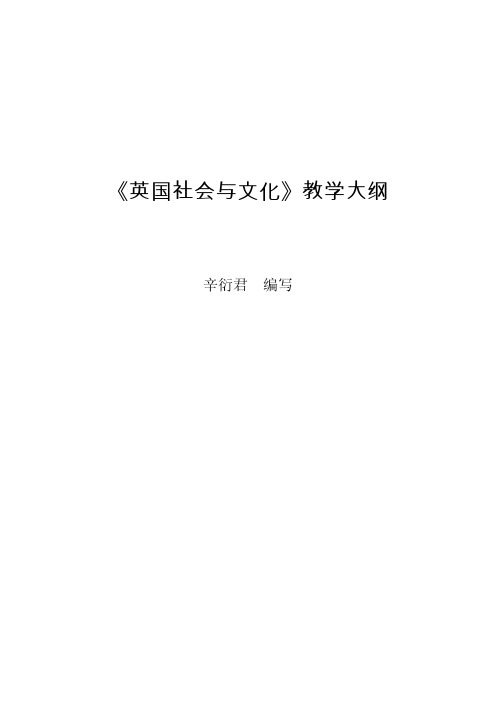
《英国社会与文化》教学大纲辛衍君编写英语专业课程教学大纲798 目录前言 (799)一、概述 (799)二、课程教学目的和基本要求 (799)三、课程主要教学内容及学时分配 (799)四、相关教学环节 (799)五、考核方法 (799)六、教学方法和手段 (799)Unit One: A General Survey of the United Kingdom (800)Unit Two: The Government of the United Kingdom (801)Unit Three: Politics, Class, and Race (802)Unit Four: The UK Economy (803)Unit Five: British Literature (804)Unit Six: The Education System (805)Unit Seven: British Foreign Relations (806)Unit Eight: The British Media (807)Unit Nine: Sports in Britain (808)Unit Ten: Holidays and Festivals in Britain (809)英国社会与文化前言一、概述《英国社会与文化》是英语专业本科的一门选修课。
本课程的学习旨在使学生了解英国的历史、地理、社会、经济、文化、政治、教育、宗教等方面的情况及其文化传统,促进对英语语言的深层理解和应用,拓展学生的西方文化视野。
本大纲编写人员为辛衍君。
二、课程教学目的和基本要求本课程以社会、文化为纲,多方面系统地概括和介绍英国的社会与文化方面的种种特点。
通过该课程的学习,学生应对英国的历史和现状有一定的了解;对英国的社会与文化有一个总体的把握,从而能从广义的文化哲学层面去审视西方文明的精髓,提高学生对中西文化差异的敏感性、海纳百川的文化兼容性以及处理文化差异的灵活性,培养和提高学生的跨文化交际能力。
英美国家概括 判断正误 英国部分

英美国家概括判断正误The United Kingdom of Great Britain and Northern Ireland Unit 11.Britain is no longer an imperial(帝国) country. T2.The Commonwealth(共和国,民主国) of Nations includes all European countries. F3.1 in 10 of the British population are of non-European ethnicity(种族地位,种族特点). F4.The stereotype(陈规,刻板模式) of the English gentleman never applied(使适用) the majority of the British people. T5.Great Britain includes 3 constituent countries;England, Scotland, and Wales. T6.Northern Ireland is part of Great Britain. F7.When people outside the UK talk about England, they mistake it as Britain sometimes. T8.The Scots and Welsh have a strong sense of being British. F9.Scotland was never conquered by the Romans. T10.Most people in Scotland speak the old Celtic language, called “Gaelic”. F11.Scotland was unified with England through peaceful mean. T12.Wales is rich in coal deposits. T13.Cardiff, the capital of Wales, is a large city. F ?? largest14.The title of Prince of Wales is held by a Welsh according to tradition. F威尔士在1284年被英格兰合并,在爱德华一世征服了威尔士(1277年—1284年)的过程中,他按照威尔士人的要求:“一位在威尔士出生、不会讲英语、生下来第一句话说威尔士语的亲王”作为他们的领袖,爱德华一世将其即将分娩的王后接到威尔士,王子出生后即被封为威尔士亲王,以表示对威尔斯的重视并强化威尔士人的认同感,从此以后,英皇室便将皇储封为威尔士王子,皇子妃封为威尔士王妃,成为皇室继承法统规则之一。
《英美概况》教学大纲
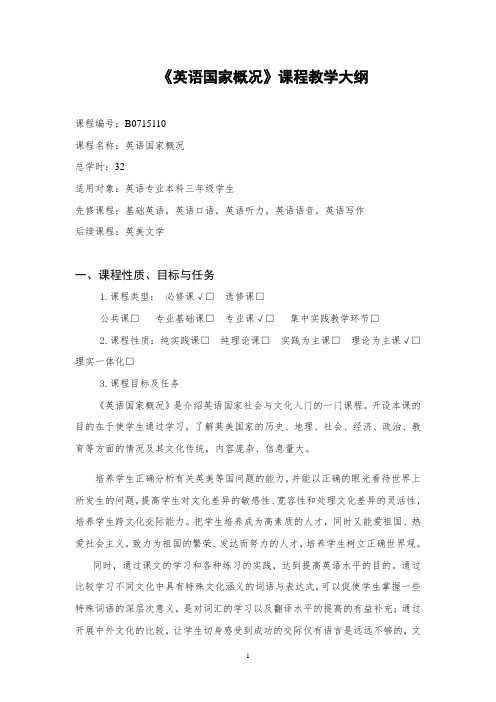
《英语国家概况》课程教学大纲课程编号:B0715110课程名称:英语国家概况总学时:32适用对象:英语专业本科三年级学生先修课程:基础英语,英语口语,英语听力,英语语音,英语写作后续课程:英美文学一、课程性质、目标与任务1.课程类型:必修课√□选修课□公共课□专业基础课□专业课√□集中实践教学环节□2.课程性质:纯实践课□纯理论课□实践为主课□理论为主课√□理实一体化□3.课程目标及任务《英语国家概况》是介绍英语国家社会与文化入门的一门课程。
开设本课的目的在于使学生通过学习,了解英美国家的历史、地理、社会、经济、政治、教育等方面的情况及其文化传统,内容庞杂、信息量大。
培养学生正确分析有关英美等国问题的能力,并能以正确的眼光看待世界上所发生的问题,提高学生对文化差异的敏感性、宽容性和处理文化差异的灵活性,培养学生跨文化交际能力。
把学生培养成为高素质的人才,同时又能爱祖国、热爱社会主义,致力为祖国的繁荣、发达而努力的人才,培养学生树立正确世界观。
同时,通过课文的学习和各种练习的实践,达到提高英语水平的目的。
通过比较学习不同文化中具有特殊文化涵义的词语与表达式,可以促使学生掌握一些特殊词语的深层次意义,是对词汇的学习以及翻译水平的提高的有益补充;通过开展中外文化的比较,让学生切身感受到成功的交际仅有语言是远远不够的,文化方面的因素有时所起的作用远远大于语言本身,必将为英语学习者成功地参与国际商务活动,更有效地进行国际合作与交流打下坚实的文化基础。
二、课时分配三、教学组织Unit One Introduction to the UK[教学目标与要求]:Understanding of:1 geographical features, climate2 characteristics of the UK3 history of the UK4distribution of the UK’s population[本章主要内容]:1 geographical features, climate2 characteristics of the UK3 history of the UK4distribution of the UK’s population[本章重点]:1 features of invasion of the UK2 the Great Empire, gentleman[本章难点]:Troubles in the Northern Ireland[本章思考题]:1.What is gentleman?2.The influences of the Great EmpireUnit Two The government of the UK[教学目标与要求]:Understanding of:1 Constitutional Monarchy2 British parliament and its functions3 British government[本章主要内容]:1 Constitutional Monarchy2 British parliament and its functions3 British government[本章重点]:1 Constitutional Monarchy2 British parliament and its functions[本章难点]:Constitutional Monarchy[本章思考题]:1.How long do you think the royal family can exist?Unit Three Politics, class and race[教学目标与要求]:Understanding of:1 understanding of the general election of the UK2 social class3 races[本章主要内容]:1 understanding of the general election of the UK2 social class3 races[本章重点]:1 the general election of the UK2 multiracial society[本章难点]:the general election of the UK[本章思考题]:1.The system of general elections and its influence in the worldUnit Four The UK economy[教学目标与要求]:Understanding of:1 understanding the position of the UK after the WW II2. the reason of the decline3 characteristics of British agriculture and industry[本章主要内容]:1 understanding the position of the UK after the WW II2. the reason of the decline3 characteristics of British agriculture and industry[本章重点]:1 the reasons for the decline2.the trends for the British economy[本章难点]:the reasons for the decline he general election of the UK[本章思考题]:1.The privatization and reform in the economic developmentUnit Five British literature[教学目标与要求]:Understanding of:1 the history of British literature2 writers3 schools4 divisions of literal periods[本章主要内容]:1 the history of British literature2 writers3 schools4 divisions of literal periods[本章重点]:1 the history of British literature2 well-known writers[本章难点]:divisions of literal periods[本章思考题]:1.Describe a writer/ a school/work you are most familiar with?Unit Six British education system[教学目标与要求]:Understanding of:1 the history of education2 education systems3 higher education[本章主要内容]:1 the history of education2 education systems3 higher education[本章重点]:1 the history of education2 education systems[本章难点]:higher education[本章思考题]:1.Compare British and Chinese higher educationUnit Seven British Foreign Relations[教学目标与要求]:Understanding of:1 UK foreign policies and their makings2 Britain and international institutions3 Britain and the United States[本章主要内容]:1 UK foreign policies and their makings2 Britain and international institutions3 Britain and the United States[本章重点]:1 UK foreign policies and their makings2 Britain and the United States[本章难点]:Britain and the United States[本章思考题]:1.The change of British image in international world from Iraqi warUnit Eight the British Media[教学目标与要求]:Understanding of:1 British newspapers2 broadcast media3 television media[本章主要内容]:1 British newspapers2 broadcast media3 television media[本章重点]:1 British newspapers2 broadcast media[本章难点]:British newspapers[本章思考题]:1.The functions of media in cultural acquisitionUnit Nine American beginnings[教学目标与要求]:Understanding of:1 a new land2 the settlement in Virginia3 Puritan New England4 Catholic Maryland5 Quaker Pennsylvania6 American revolution[本章主要内容]:1 a new land2 the settlement in Virginia3 Puritan New England4 Catholic Maryland5 Quaker Pennsylvania6 American revolution[本章重点]:1 A new land2 American revolution[本章难点]:American revolution[本章思考题]:1.How did modern development in Europe influence the settlement of North American colonies?Unit Ten Political system in the United States[教学目标与要求]:Understanding of :1 legislative branch2 executive branch3 Judicial branch4 political parties[本章主要内容]:1 legislative branch2 executive branch3 Judicial branch4 political parties[本章重点]:1 Checks and balance2 Political parties[本章难点]:checks and balance[本章思考题]:Compare the political systems between the UK and the USAUnit Eleven American economy[教学目标与要求]:understanding of:1.industry revolution2.free enterprise3 . American agriculture[本章主要内容]:1.industry revolution2.free enterprise3. American agriculture[本章重点]:1 free enterprise2. the roots of affluence[本章难点]:the roots of affluence[本章思考题]:The influences of American economy on the worldUnit Twelve Religion in the USA[教学目标与要求]:understanding of:1 religious liberty2. protestants in the USA3. Catholics in the USA[本章主要内容]:1 religious liberty2. protestants in the USA3. Catholics in the USA[本章重点]:1 religious liberty2 religious diversity[本章难点]:American character of religion[本章思考题]:The effects of religion on American culture and everyday lifeUnit Thirteen American literature[教学目标与要求]:Understanding of:1 the history of American literature2 writers3 schools4 divisions of literal periods[本章主要内容]:1 the history of American literature2 writers3 schools4 divisions of literal periods[本章重点]:1 the history of American literature2 well-known writers[本章难点]:divisions of literal periods[本章思考题]:Describe a writer/ a school/work you are most familiar with?Unit Fourteen Education system in the United States[教学目标与要求]:Understanding of:1 the history of education2 education systems3 higher education[本章主要内容]:1 the history of education2 education systems3 higher education[本章重点]:1 the history of education2 education systems[本章难点]:higher education[本章思考题]:1.Why American schools have more international students than any other countries?Unit Fifteen Social problems in the USA[教学目标与要求]:Understanding of:1 racial problems2 drug abuse3 crimes4.abuse of power by government and corporation[本章主要内容]:1 racial problems2 drug abuse3 crimes4.abuse of power by government and corporation[本章重点]:1 racial problems2 drug abuse[本章难点]:racial problems[本章思考题]:Why is it perceived as a major threat to American society?Unit Sixteen Post-WWII American foreign policy[教学目标与要求]:understanding of:1 the beginning of the cold war2 arm races3 the engagement and expansion[本章主要内容]:1 the beginning of the cold war2 arm races3 the engagement and expansion[本章重点]:1 the cold war2 the engagement and expansion[本章难点]:the cold war[本章思考题]:The current international relationships and the role America plays in it四、课程考核学生总评成绩取决于学生的出勤情况、课堂参与、学期论文、课后作业和期末考试成绩。
- 1、下载文档前请自行甄别文档内容的完整性,平台不提供额外的编辑、内容补充、找答案等附加服务。
- 2、"仅部分预览"的文档,不可在线预览部分如存在完整性等问题,可反馈申请退款(可完整预览的文档不适用该条件!)。
- 3、如文档侵犯您的权益,请联系客服反馈,我们会尽快为您处理(人工客服工作时间:9:00-18:30)。
Unit 8 British Foreign Relations (英国的外交关系)一、本单元重点内容1. Active in setting up the United Nations (积极推进联合国的成立)2. Foreign policy influenced by its history and geopolitical traits(受其历史和地缘政治影响的外交政策)3. Long-term physical separation from the European continent (长期与欧洲大陆隔绝)4. The involvement of the Foreign and Common wealth Office (英国外交与联邦事务部的参与)5. The Treasury (财政部)6. The permanent member of the UN Security Council [(英国)是联合国常任理事国之一]7. The member of the European Union (欧盟成员国之一)8. The member of the Commonwealth (英联邦的成员国)9. The special relationship with the United States (与美国的特殊关系)10. The presence of superpower bases in Britain (在英国存在超级大国的军事基地)11. Its participation in NATO [积极参与北约(北大西洋公约组织)的活动]二、本单元重、难点辅导1. the British empire and its endThe Britain used to rule 1/3 of the globe and thus became a great empire in the world. After the WWII, the British empire began to decline as more and more former colonies declared their political independence. Throughout the next few decades, the process of decolonization continued, though sometimes the process was full of violence. The end of the great British empire was inevitable. Today the age of British imperialism is gone. But the British foreign policy is still influenced by Britain’s imperial past. An d because it had a strong military power and prestige, it had a big influence on the postwar international order. (*Some former colonies—Australia and Canada— still looked to Britain as the center of their political and cultural world.)2. the foundations of British foreign policyThe contemporary foreign policy of the UK is greatly influenced by its imperial history and also by its geopolitical traits(地缘政治特点). 1)As Britain lost its empire so recently, British policy-makers frequently forget that Britain is not as influential as it used to be in world affairs. 2)Another decisive influence upon the way Britain handles its external affairs is geopolitical. As Britain is an island, it has created a sense of isolation in its subjects, which results in Britain’s schizophrenic(精神分裂的,反复无常的) attitude to Europe. (But Britain’s physical isolation has long been reduced by the development of airlines and more recently by the opening of the Channel Tunnel, which links Britain to continental Europe)当代英国的外交政策很大程度上受其帝国主义历史和地缘政治特点的影响。
由于英国失去其帝权的时间还不长,英国的决策者们经常会忘记英国在世界事务中已经不如从前那样有影响力了这一事实。
影响英国处理外事的的另一决定性因素是其地缘政治特点。
英国岛国的地理位置使那里的居民产生了一种心理上的孤独感,这导致英国对于欧洲的态度反复无常。
(但是这个问题由于飞机的发明和联系英国与欧洲大陆的海底隧道的开通而得到缓解。
)3. the making of Britain’s foreign policy 英国外交政策的制定The general direction of Britain’s foreign policy is mainly decided by the Prime Minister and Cabinet. The Foreign and Commonwealth Office (FCO)(英国联邦与国际事务部), the main governme nt department, plays a significant role in the making of Britain’s foreign policy. Many other government ministries such as the Ministry of Defence and the Department of Trade and Industry also play a part in formulating and carrying out the government’s d ecisions. But an extremely influential player in Britain’s foreign policy is the Treasury. The Treasury makes decisions on how much money other departments can have each year.英国外交政策的总体方向主要由首相和其内阁决定. 英国政府的主要部门,英国联邦与国际事务部, 在制定英国的外交政策方面起着重要的作用。
许多其它的政府部门,比如,国防部,贸易与工业部在制定和执行政府的决议中也起着重要作用。
但是对英国的外交政策影响极大的一个部门就是财政部。
其它部门每年可以花费的金额由财政部来决定。
* Britain is parliamentary democracy, the government’s foreign policy in theory represents the desires of its electorate.4. Britain’s relationship with international institutions1) one of the 5 permanent members of the UN Security Council (联合国安理会常任理事国) — Russia, China, the US, France and the UK2) its membership in the European Union (Britain joined the European Economic Community in 1973, which has been called European Union since 1993. Britain’s participation in the EU remains controversial. At the center of the controversy is the fact that it is not clear about what the EU is and what it will become. The UK has always been interested in encouraging free trade between countries and is therefore very supportive of the EU as a free trade area. Britain likes to regard the EU as place where economic cooperation is possible and where a flow of trained personel and goods are possible. But Britain ha always been less enthusiastic about giving up its national sovereignty to a European government.)英国于1973年加入欧洲经济共同体,1993年,欧共体被更名为欧盟.英国加入欧盟一事备受争议.争议的焦点是:关于欧盟的本质是什么,发展方向是什么,都不清楚.英国一直积极鼓励国与国之间的自由贸易,因此比较倾向于把欧盟看作是一个自由贸易区。
英国喜欢把欧盟看作是一个可以进行经济合作的地方,人员和商品都可以自由流通的地方。
